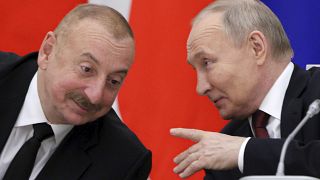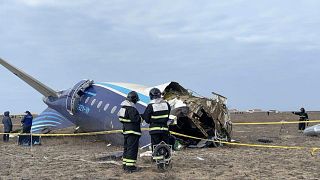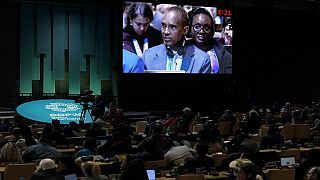Azerbaijan
Countries at the United Nations COP29 climate talks agreed to provide $300 billion in annual climate finance by 2035 in a contentious last-minute deal on Sunday.
Developing countries have slammed the funding as insufficient, saying it is far short of the amount needed to help them cope with the impacts of climate change.
Experts estimate poorer nations will require $1.3 trillion dollars in public and private investment by 2035 to adapt to climate change.
The funding is, however, three times more than the $100 billion a year agreed on in 2009 that is expiring soon.
Some delegations said Sunday’s deal is headed in the right direction, with hopes that more money flows in the future.
UN Climate Change Executive Secretary, Simon Stiell, said rich countries need to respect the commitments they have made.
"Like any insurance policy, it only works if premiums are paid in full and on time. Promises must be kept to protect billions of lives, So this is just the starting point. It can't be the ending point.”
Developing countries have contributed the least to climate change but are suffering the most from it.
They need the money to wean themselves off coal, oil and gas, adapt to future global warming, and to pay for damage caused by climate change’s extreme weather.
COP29 President Mukhtar Babayev gavelled the deal into acceptance before any nation had a chance to speak.
When they did, they blasted him for being unfair to them, the deal for not being enough, and the world's rich nations for being too stingy.
"We find it deeply disappointing because the amount that has been committed is extremely low,” said Harjeet Singh, global engagement director for the Fossil Fuel Non-Proliferation Treaty Initiative.
“It's just $300 billion, and that too, by 2035, which is woefully inadequate and really very far away. It lets developed countries off the hook."
The deal is seen as a step toward helping countries on the receiving end create more ambitious targets to limit or cut emissions of heat-trapping gases that are due early next year.
It is part of the plan to keep cutting pollution with new targets every five years, which the world agreed to at the UN talks in Paris in 2015.
Countries also anticipate that this deal will send signals that help drive funding from other sources, like multilateral development banks and private sources.
"What we need to do now is to continue moving forward, find additional sources, things like international taxes perhaps. Other ways of really generating the kinds of resources that developing countries are going to need,” said David Waskow, director of Director of International Climate Initiative for World Resources Institute.
Brazil will host next year's UN Climate Conference in the city of Belem, the gateway to the Amazon River and the rainforest which stores huge amounts of planet-warming greenhouse gases.











01:37
Indigenous and climate activists rally in Brasília ahead of COP30
Go to video
Major nations agree on first global tax on shipping’s greenhouse gas emissions
01:41
Ocean carbon solutions face growth and environmental challenges
01:54
Africa's GDP growth to rebound amid ongoing poverty and climate challenges
02:02
New report finds only seven countries met world clean air standards in 2024
03:46
With 500 species, Moroccan exotic garden an oasis of biodiversity